Vincenzo Drogo, a 31-year-old gay man from Italy, had lived in Budapest for seven years. There, he learnt to speak Hungarian and met his Hungarian husband, Tamas.
"We could not walk hand by hand. You would hear all the time like, you know, [people] commenting," Mr Drogo told RTÉ News.
"The environment is quite homophobic and the propaganda and the law affected it very badly."
The law Mr Drogo is referring to is Hungary's Child Protection Law, passed by the Hungarian parliament in June 2021. It prohibits the promotion of homosexuality and gender change in schools, but also in books, films and advertisements for minors.
Mr Drogo, a professional ballet dancer, and his husband - the couple married in Italy in 2022 - moved from Budapest to Frankfurt in Germany last year. It was a decision, he said, that was made for financial reasons. Hungary has one of the highest rates of inflation in the European Union.
Now, 15 EU member states, including Ireland, have joined a European Commission infringement case against Hungary over the 2021 law at the Court of Justice of the EU.
The commission’s case argues that Hungary, by passing the law, has failed to safeguard the terms of the EU's Charter of Fundamental Rights.
France and Germany joined the case earlier this month, which already included Austria, Belgium, Denmark, Finland, Greece, Ireland, Luxembourg, Malta, the Netherlands, Portugal, Slovenia, Spain and Sweden. The European Parliament has also joined the legal action.
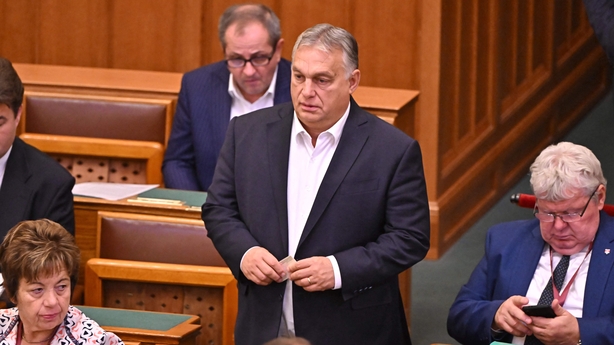
Many Hungarian NGOs and civil liberties groups have criticised the law as anti-LGBTQI and discriminatory.
"The effect of the legislation is very overwhelming. It created an extreme chilling effect," Dr Eszter Polgári of the Háttér Society told RTÉ News.
Dr Polgári, whose NGO campaigns for LGBTQI rights and has advised EU governments on the impact of the law, said that the act became "self-enforced very quickly".
Hungary’s Child Protection Law or, more precisely, "Act LXXIX on taking more severe action against pedophile offenders and amending certain acts for the protection of children" bans the showing of pornographic content to minors, and content that "propagates or portrays divergence from self-identity corresponding to sex at birth, sex change or homosexuality".
Hungary’s government says that the law aims to protect children.
"We will not give in to pressure, we will protect our children," wrote Hungary’s justice minister, Judit Varga, in a Facebook post on 8 April.
"The Hungarian reasoning is fully in line with the Charter of Fundamental Rights of the EU, which states that the upbringing of children is the exclusive right of parents," wrote Ms Varga, who added that education was a so-called "national competence" under EU law.
Márta Pardavi, co-chair of the Hungarian Helsinki Committee, told RTÉ News that the law "discriminates against part of Hungary's society by making them less visible and by stigmatising them".
"This degree of discrimination is so severe that it actually goes against the EU's core values," said Ms Pardavi.
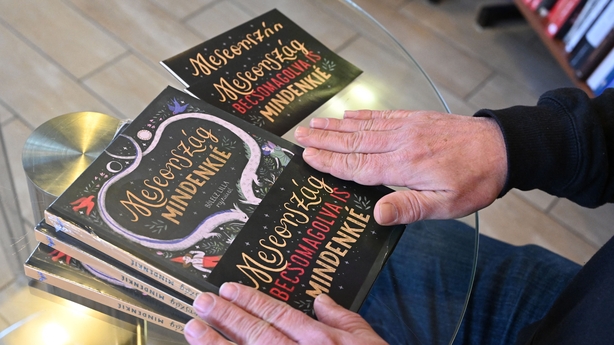
Soon after the law was passed by Hungary's parliament, Mr Drogo said he tried to buy a Hungarian children's book called "A Fairy Tale for Everyone", which features LGBTQ characters in traditional children's fairytales.
He says that the book was only available in specific bookshops, which were reluctant to display it.
Upon its release in 2020, the book was criticised by right-wing politicians in Hungary.
A far-right politician tore the book apart at a press conference whilst Reuters reported at the time that a spokesperson for Mr Orbán called the publication "homosexual propaganda".
The 2021 law does not impose criminal sanctions. Instead, it can, in principle, lead to a publisher’s licence being revoked.
Last September, Hungary’s Media Council found that a scene featuring two girls kissing in an episode of Jurassic World, an animated series for children, as well as the depiction of scary creatures chasing characters, "could be harmful to the moral development of minors".
Netflix, which produces Jurassic World, is registered in the Netherlands, meaning that Hungary’s Media Council had to resort to asking the Dutch media regulator to investigate the case.
In an email reply to questions from RTÉ News, a spokesperson for Hungary’s Media Council said that it had, to date, received 80 requests to investigate material under the new law.
Fifty-three of the complaints concerned content published by foreign media companies.
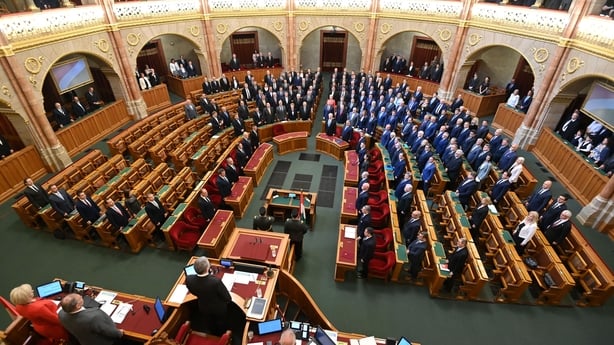
Fidesz, the ruling right-wing party of Prime Minister Viktor Orbán, enjoys a two-thirds majority in Hungary’s parliament and argues for a conservative, traditional version of the family.
The 2021 law (Act LXXIX) was the not the first piece of Fidesz legislation to affect gay and transgender people.
In May 2020, the government introduced legislation that banned legal gender recognition for people wishing to have their gender identity recognised as different from their gender at birth.
In December that year, Hungary’s parliament voted to limit adoption to married couples, which it defined as marriage between a man and a woman. This effectively prevented gay couples from adopting children.
And, in 2018, the government removed accreditations for Masters and PhD programmes covering gender studies at universities.
Ms Pardavi said that LGBTQ rights in Hungary are often framed by the government as a "threat to conservative family values and as a threat to children".
Hungarian law does not allow for same-sex marriage. However, since 2009, same-sex civil partnerships have been recognised.
Mr Orbán told reporters in June 2021 that his country’s Child Protection Law is "not about homosexuals".
Instead, Hungary’s prime minister said it concerns the type of sexual education that parents want their children to receive.
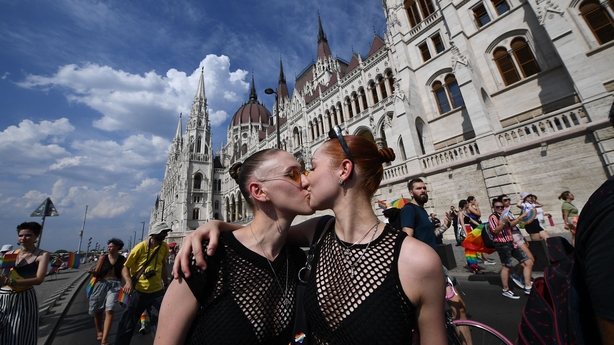
A large majority of gay and transgender people in Hungary hide their sexual orientation according to a 2020 survey for the EU Agency for Fundamental Rights.
Some 32% are open about being LGBT as opposed to the EU average of 47%.
But public attitudes in Hungary may be changing.
One survey of 1,000 people conducted in 2021 – one month after the introduction of the law – by polling agency Median found that 74.5% of respondents believe that transgender people should be able to change their gender and name.
The same survey found that 66% of those polled believed that young people should hear about sexual minorities as part of the school curriculum.
Mr Drogo said that his Hungarian in-laws have always welcomed him.
"They were very looking forward to meet with me and could not understand why these things should be hidden," said Mr Drogo.
The Fidesz government held a referendum in April 2022 on the terms of the 2021 law – in an attempt to show that a majority of Hungarians favoured the legislation.
But it backfired badly.
Fewer than 50% of voters cast their ballots, meaning the referendum was declared invalid – the required threshold for a referendum to be recognised in Hungary.
It made little difference though, as the parliament’s vote in June 2021 enshrined the act in law.
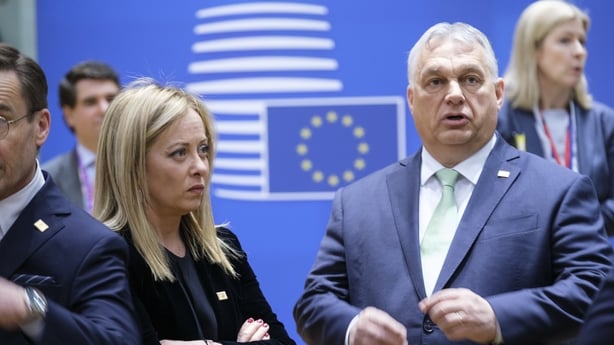
The commission’s case against Hungary marks a growing divide between Budapest and mainly western European governments on rule-of-law issues.
In recent years, Mr Orbán’s government has been criticised by the commission for its moves to curb the independence of the judiciary and the country’s media.
Last December, the commission froze EU cohesion funds bound for Hungary because it had failed to implement 17 separate reforms to tackle corruption, along with a number of other measures dealing with judicial independence.
A compromise was reached on that occasion.
But Hungary’s Child Protection Law may be a red line for the commission and for the governments who have signed up to the case.
Ireland joined the case in late March, becoming the fifth country to do so.
"The Hungarian law represents a clear form of discrimination based on sexual orientation, gender identity and expression," read a statement issued to RTÉ News by a spokesperson at the Department of Foreign Affairs.
"Ireland has consistently held that Hungary’s position is completely at odds with Ireland's national interest in protecting the rights of LGBTI+ persons and with the fundamental values of the EU."
What happens next?
The deadline for joining the commission’s legal action – case number C-769/22 – against Hungary closed on 6 April.
A date for the case is yet to be set.
Gabor Gyori, a senior analyst at Policy Solutions, a political research institute in Budapest, told RTÉ News that a compromise between the commission and Hungary is "likely, but not certain".
"This issue can no longer be separated from EU funding and all other issues that the European Commission has raised with Hungary," said Mr Gyori.
Hungary has previously reached compromises with the EU on other matters in order to unlock funding.
This week Mr Orbán's political director told conservative US talkshow host Tucker Carlson on Fox News that EU institutions had "started a legal persecution of Hungary" and that Budapest would not back down.
How far the commission is willing to go to make EU funding conditional upon Hungary making changes to its Child Protection Law – namely the elements it alleges do not conform with fundamental EU rights – may determine how this case ends.







